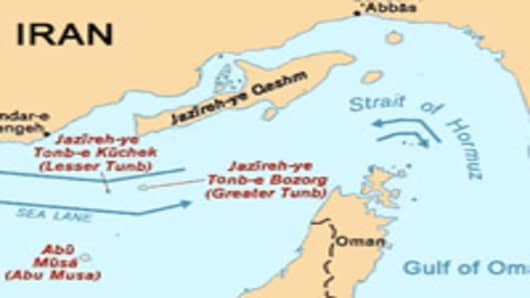The Iranian Foreign Ministry has confirmed it has received a letter from the United States concerning the Strait of Hormuz, “via three different channels.” Authorities were considering whether to reply, although the contents of the letter were not divulged.
"The Islamic Republic is studying the letterand will respond to it if it is necessary," Iran's Foreign Ministry Spokesman Ramin Mehmanparast said.
On Saturday, state-run news agency IRNA reported that the Iranian Foreign Ministry sent a letter to the United States saying that it had reliable information about the complicity of Western intelligence agencies in the assassination of an Iranian nuclear scientist in Tehran last week. The US has denied any involvement.
The latest developments are likely to be the focus of talks when General Martin Dempsey, chairman of the US Joint Chiefs of Staff, visits Israel this week. A joint military exercise between the United States and Israel, billed as the largest between the two, has now been postponed to the second half of 2012 for reasons that remain unclear.
Experts have told CNBC that there is concern about Israel surprising the United States with a unilateral strike against Iran, should diplomatic efforts and economic sanctions not bring about a change in Iran’s nuclear program. Intelligence company Exclusive Analysis described such a scenario as becoming “likely” by June this year, with the closure of the Strait of Hormuz being one of Iran’s “few options” to respond.
British Foreign Secretary William Hague told Sky News television on Sunday that the government there was not calling for military action, but did not rule it out either.
Over the weekend, Tehran OPEC Governor Mohammad Ali Khatibi fired a warning shot at Gulf producers, saying that if a “green light” is given to replacing Iran’s oil, then “these countries would be the main culprits for whatever happens in the region—including the Strait of Hormuz.”
In comments carried by the Sharq daily newspaper, Khatibi added that they “should not cooperate with these adventurers…these measures will not be perceived as friendly.”
Iran, OPEC’s second largest oil producer, has made it clear it would not tolerate a wider embargo on its oil exports, and would respond with a closure of the Strait of Hormuz, the narrow waterway that serves almost a fifth of global oil demand.
Some of Iran’s major crude customers, including China, South Korea and Japan, have already approached several Gulf producers in an apparent bid to explore alternative sources of crude imports.
But Saudi Arabia’s Oil Minister Ali Al-Naimi rejected any intent of replacing Iranian crude.
“We never said that Saudi Arabia is seeking to compensate for Iranian output if it is embargoed,” Al-Naimi told the Saudi-based Al-Eqtisadiah newspaper. He maintained that with a total production capacity of 12.5 million barrels per day, Saudi Arabia could meet any rise in global demand “for whatever reason”.
European Union officials are due to meet on January 23 to decide whether toimpose an embargo on more than 500,000 barrels per dayof crude oil imports from Iran. Although most observers expect the embargo to be confirmed, much will depend on its implementation, given the economic vulnerability of some of Europe’s largest importers of Iranian crude: Greece, Spain and Italy.


